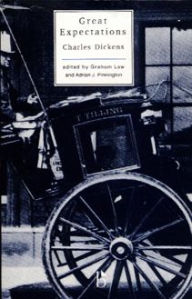
“’Great Expectations,’ ‘A Tale of Two Cities,’ ‘Little Dorrit,’ – All major influences on Leo Tolstoy.” – Gilmore Girls, Episode 1, Season 1
The first episode of Gilmore Girls begins with Rory attending her first day at Chilton. The posh private school’s hefty tuition bill is what causes Lorelai to seek, reluctantly, financial aid from her parents, thus launching two of the series’s key themes: Lorelai and her parents’s conflicting values about what it means to have wealth and status and their struggle to connect in the face of these conflicting values. In her first literature class at Chilton, Rory listens as her teacher discusses Charles Dickens’ influence on Leo Tolstoy. As the former was a huge influence on the latter, several of Dickens’ novels are cited—the three in the above quote as well as “David Copperfield.” I intend to (re)read all of them.
This week, I started with “Great Expectations,” which has been referred to as The Perfect Novel. In this bildungsroman, orphaned Pip narrates his story, beginning with his childhood in an English village, where his sister and her husband raised him, and his encounter with an escaped convict who will change Pip’s life. We follow Pip as he experiences an unexpected change of fortune that enables him to leave his apprenticeship as a blacksmith and enter a higher social station in London. We follow his struggles and missteps in this new life and discover his misconceptions about it. And we follow him through his eventual moral development and growth.
The novel features fully human characters who are so vividly drawn that I often expected to turn around and see them in the room with me. What makes them so alive is the depth of emotional resonance. Their inner lives feel so familiar—the challenges and temptations of money and status, the unpleasant reality of self-absorption and greed, the heavy prices we pay for our mistakes, but also the beautiful potential for self-sacrifice and unconditional love, for forgiveness and redemption.
I love to say about novels that they are the best kind of self-help. Through characters’s journeys and self-discoveries, we gain insight into ourselves, into our challenges and our gifts. “Great Expectations is a prime example of this for me. Whether it is The Perfect Novel, I cannot say, as I’m unsure how one would quantify such a thing. But on a personal level, I agree. “Great Expectations” is one of my favorite books of all time, featuring one of my favorite literary characters of all time (Joe Gargery), and one of my favorite literary scenes of all time (see Chapter 4, the scene with the gravy). Through Pip’s journey, we learn what it means to be good and to see the value in people beyond class and station in life. We see the value of kindness and what it means to contribute to one’s community in a meaningful way.
When it comes down to it, isn’t this what the Gilmore Girls series is also about?
We would love for you to join us on this challenge. To see the complete list of books, please visit The Gilmore Girls Reading Challenge. If you would like to participate, please email jessicacollinsphotography@gmail.com.